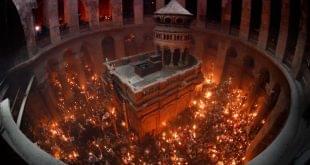Herland Report: Many, and especially today, are fearful of breaking out of the safe spot – the “politically correct” sphere – and stand up for what they believe in.
If they do, the risk for public punishment is high, alienation, slander in the media and so on.
We proudly present an interview with Norwegian TV star, Kari Jaquesson, who chose to do just that. Step out of the box to speak up for those who are suffering.
She left her safe haven in Norway and went to war torn Syria to meet with the minorities and Christian groups to better understand what is really going on. First published in March, 2018.
“I’m on my way to Syria. For the first time in my life I am going to a country at war. I have been following the crisis, both through national and international media, both commercial and independent. The information is fragmented and unbalanced.”
“The voice of ordinary Syrians is nowhere to be heard. I want to see for myself and hear what the people in the streets think, unfiltered, with no intermediary.”
“There will be a lot of impressions, I will come to see and hear many things that are impossible to prepare for,” said Kari Jaquesson in this interview with the Herland Report. (Feature photo: Tor Lindseth)
READ MORE:
- How to create Revolutions and #Serbia, Libya, Syria – Joaquin Flores.
- White Helmets bedrageri “Last Men in Aleppo” – Eva Thomassen
- Høstens serie: Lever vi i folkestyre eller i oligarki? – Hanne Nabintu.
- Faktafeil fra Faktisk.no om Syria, Eva Thomassen, Al Qaida og Syria.
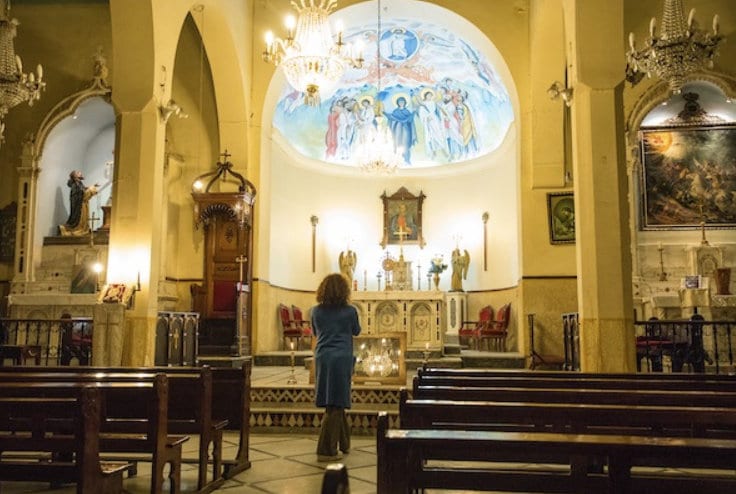
 Hanne Nabintu Herland, founder of The Herland Report: – Kari Jaquesson, you are known as one of Norway’s TV queens and have inspired us all to work out, eat healthy and have a positive lifestyle in your television programs throughout the years. In the past year, you got a lot of attention in a new way, and as a result have been heavily attacked in the mainstream media.
Hanne Nabintu Herland, founder of The Herland Report: – Kari Jaquesson, you are known as one of Norway’s TV queens and have inspired us all to work out, eat healthy and have a positive lifestyle in your television programs throughout the years. In the past year, you got a lot of attention in a new way, and as a result have been heavily attacked in the mainstream media.
You have engaged as an activist against the war in Syria and actively sought to find out what it is like to be living in Syria, now said to endure the greatest humanitarian disaster of our time.
The kind of humanity you have shown through this, as you traveled from your safe haven in Norway and visited Syria to meet ordinary people and persecuted minorities there, is a typical story we would like to highlight at The Herland Report.
In our point of view, this kind of action is done in love with people who suffer, is the very core of the Christian faith.
Jesus sacrificed everything to help people and we look at you, Kari as an example of one who follows in Jesus’ footsteps to do good to your fellow human beings. Everything is so politicized today, and it is a problem.
Yet, you traveled with an international group of international journalists, well knowing that when you came back to talk about what you experienced, the media would take a punch at you, attempt to smear you and subject you to some harsh exposure. Still, you fearlessly told the stories about the people of Syria.

Kari Jaquesson: – Many in the public have probably been surprised about me expressing such strong opinions about Syria and other topics.
They know me as the smiling “fitness lady” on television. However, there is no conflict between being a happy, smiling lifestyle coach and motivator and being an engaged citizen and highlighting serious issues. I’m making people exercise with a smile just as always, and have been active in politics and social debate for years. But lately I have taken bigger steps and it is getting noticed.
Politics is far too important to be left to politicians. Today, we are seeing more and more how politicians make several decisions that in no way benefit the people or the country, politics and decisions that harm and kill people in countries that have never threatened or attacked us.
But for whom are they doing this? Certainly, not in the Norwegian people’s interest. They are not executing the will of the people they are supposed to represent. I think we should focus more on this, but the mainstream press does not.
READ MORE:
- Silicon Valley Guru, Jaron Lanier: Too many controlling Facebook algorithms.
- Orwellian Censorship on Facebook. #HerlandReport story.
- Big Brother and Totalitarian Control. Hannah Arendt.
- Free Speech is Enemy in Totalitarian West now. Hanne Herland.
Having opinions and speaking our minds is something that should be encouraged, something a healthy society must have to survive, especially among young people.
We must teach young people not to be intimidated by unreasonable opposition, attempts at ridicule and unfair, tackles.
The more dirty and fraudulent tricks the opponents use, the more they confirm that you have hit a nerve, that you have influence on the public, that you have power. And that you are right. Otherwise, they could have come up with substantive counter arguments, don’t you think?

Kari Jaquesson: – But let me tell you about this very special trip I had to Syria. Syria shares borders with several countries. Our group entered the country legally, across the border from Lebanon. Due to the sanctions that Norway have joined, no aircraft may land in Syria.
All Norwegian journalists who have travelled to Syria, with two exceptions in the last year, have entered the country illegally via Turkey.
This is an important point, because it means they have collaborated with al Qaeda and ISIL.
These groups controlled that border and, in part, still do. It also means that everything these journalists have seen and heard has been controlled by al Qaeda.
They have simply been the voice of terrorists. It is a responsibility they can’t escape. I believe that the Western press carries a great deal of responsibility for the prolonged suffering of Syrian children, women and men.
The road to Damascus is considered safe, free from snipers from the numerous militant groups. These Islamic groups all fight for a chunk of power in Syria, a country of secular, non-religious rule.
Along the way, the scenery was green and lush, with lots of oak trees.
A sign greeted us “Welcome to Syria”, we passed a poster with a little girl holding a dragon with the Syrian flag and a promise to the country “We will always make you proud”.
We passed soldiers on the truck of a car and I waved and smiled. When I was a little girl, my mother taught us to always smile and wave at soldiers.
She was born in 1941 and has lived with occupation and post-war years. Norwegian soldiers were to be appreciated. They defended the country. The Syrian soldiers smiled and waved back.
I did not expect to be skinned alive and insulted on national television for describing Syrian soldiers as humans, referring to them as people with a smile and friendly eyes, ordinary citizens, women and men from all parts of the population, from all religions, but that’s exactly what happened. It was perceived an outrage to humanize “Assad’s army”.
Rebels or terrorists?
At the border immigration office, we collect our visas. I paid 83 dollars because I am Norwegian. Americans pay $ 160. There are a lot of people in line, both young men and families.
I wonder if they are going out or into Syria. The children play and run around exactly the way children do when parents are waiting in line. Some of them become impatient and wimp, just like children everywhere.
The road continues, with steady traffic in both directions. Flowering trees in white and pink, gnarled olive trees, prepped fields, small shops, power lines the road side.
We pass houses, then areas with apartment buildings, it looks quite like Norway with terraces and plants.
We are approaching Damascus. Everything seems peaceful and normal. But it is not. Only 10 kilometres away are the so-called rebels. Militias that fire mortars and rockets against roads and cities.
I can’t call them rebels. Had anyone shot mortars and rockets against my neighbourhood and hid in the roadside to shoot me I had most definitely called them terrorists as would our police and authorities. So, to call them rebels just because they are in another country is absurd.
Damascus, a several thousand years old city
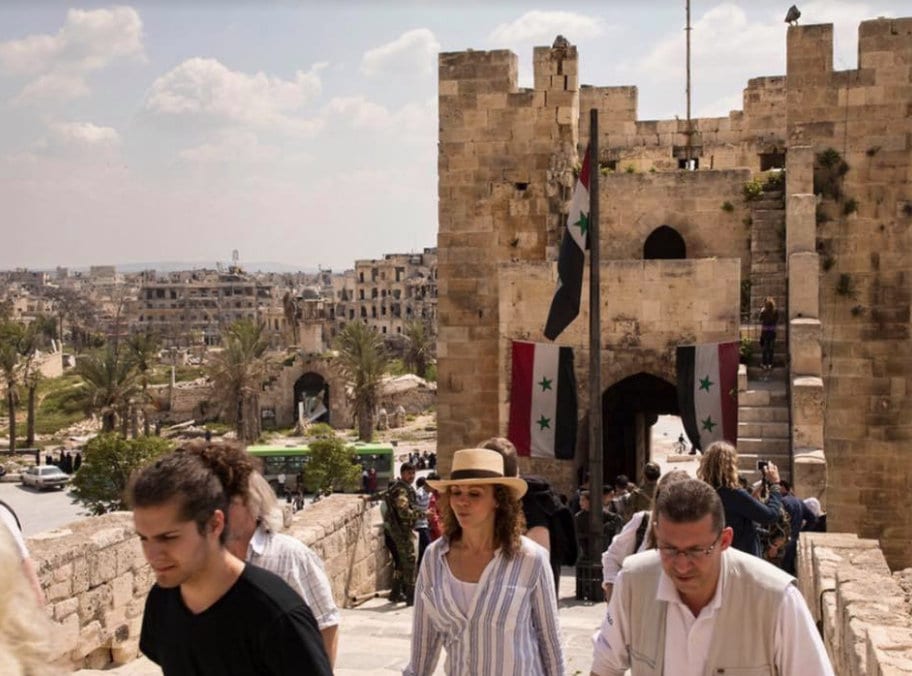
We drive into Damascus, the longest inhabited city in the world, 10,000 years of civilization and culture. We do the last stretch to the hotel by foot. We pass soldiers checkpoints. Posters of fallen soldiers are glued to the wall guarding the entrance to the old town.
The Beit Alwali hotel is a beautiful old mansion, located in the old town. The old town is so beautiful, so exciting, so full of history. In the street around the corner I will find shops run by Sunni Muslims, Shiites, Catholics, Orthodox, Protestant and Jewish Syrians, and customers from at least as many faiths.
“We don’t talk about minorities, in Syria we are all majorities,” says Ibrahim Nsier, pastor of the Arab Evangelical Presbyterian Church in Aleppo. The name may sound arabic, but he looks like the film edition of an Irish pastor, rosy cheeks, and clear blue eyes with a friendly glimpse.
As he talks about the church’s preparations to celebrate the first Easter in freedom from terrorists and in their new church after the old one was smashed, we hear the calling to prayer from one of the neighbourhoods’ minarets, a natural illustration.
The Christians in Syria were targets
It’s holy Thursday. In Syria, it is the tradition to go from church to church on this day. The churches are beautifully decorated for Easter. There are many children and young people everywhere. People light candles, pray for the living and the dead.
Almost everyone I will meet during my stay in Syria has lost someone. I’ll hear about kidnappings, torture, killing, destroyed homes and about having to flee from homes inhabited for generations, centuries.
But in the streets of Damascus we see something else. People live, smile, have fun, dress up, enjoy life. Sweethearts, friends, big families gather at the cafés and at the restaurants.
There is life in the streets and music flows from bars and clubs. In this district, we do not see women wearing headscarfs, but even women with hijab enjoy smoking shisha at the Haretna restaurant. On the big screen, we can follow Real Madrid and Barcelona fighting for the ball.
Occasionally there is a cut in the electricity and the public goes wild.
The waiters bring Meze, delicious dishes on a row eaten anywhere in the Middle East. We were served a dessert I have never seen before, vanilla ice cream with amounts of spun sugar on top. Someone cracks a joke and says that it looks like Donald Trump’s hair. But it tastes good anyway.
Fighting for a our way of life
Again, and again I will be told that this is what they are fighting for. “Our way of life” we often hear from Americans, but also Syrians will fight for their “way of life”.
In the secular country, there is freedom of religion and women can go wherever they want, study, work, be leaders, dress as they please.
Well, almost, in 2010, the use of niqab, the scarf that covers the whole face except the eyes was prohibited at the universities. In the terrorist besieged cities, however, Sharia laws were applied to religious courts and public punishment for all sorts of religious and worldly sins would be executed in public.
It is miles away from the lifestyle of modern Syria, just as far away as it would be for us in Norway. Nobody I know at home in Norway would want to live under sharia law.
I certainly do not. Neither do the clear majority of Syrians. If the terrorists had control over the city, I could not have been out and about without a male guard, would’ve had to cover my head and forget about enjoying the cold beer I ordered with my food.
According to Eng. Beshr Yazji, the minister of tourism, eight new hotels and 800 restaurants have opened over the last three years.
Syrians enjoy going out, and as the sanctions make it impossible for them to spend their money or credit cards abroad, or get a visa for that matter, the holiday money is used domestically. For us visitors, impulsive purchases are impossible, due to the sanctions from the West, it is not possible to withdraw cash from ATM or pay by credit card.
“There is also a financial war against us.” explained the minister. Both imports and exports have almost completely stopped because of the sanctions.
This also harshly affects the health sector. Syria, previously exporting medicines to over 100 countries, is now being denied important ingredients and medicines, also to treat children with cancer. Pharmacists Fadiha Salale says that not only have these goods become a lot more expensive, there is a lack of many important medicines.
Just across the street from the hotel is the orthodox church of Antioch and a follow is on its way out. Patriarch Laham the third leads the flock and stops when he sees us. He smiles, tells us he is happy to meet foreigners in Syria and gives us his blessings.
He is the first of several Christian leaders I will meet who begs me to convey that they are at risk, that the thin wall between life and death is the Syrian army and the country’s government and president. The few cases when President Assad is mentioned unasked is in this context.
Portraits of the president hang in all shops, just as the image of King Haakon and later King Olav did, at the time when the they represented security and unity for a Norway under and after the German occupation.
Maaloula – where they speak the language of Jesus
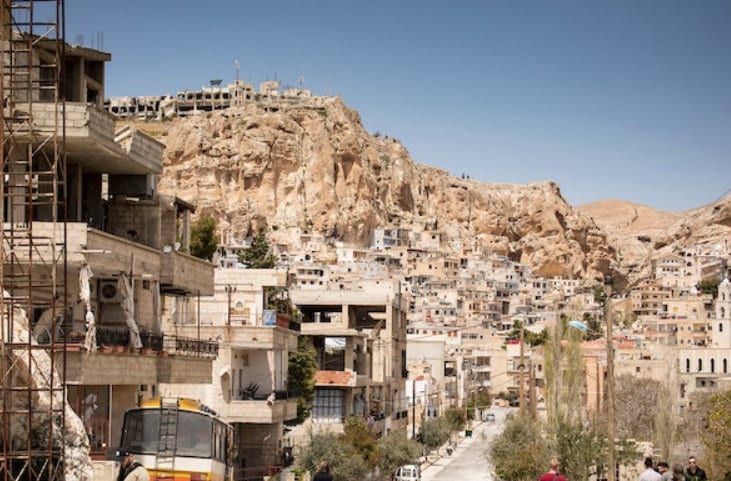
Maaloula is situated 1500 meters above sea level, not far from Damascus. This is one of the three places in the world where they still speak Aramaic, the language that Jesus would have spoken. The church bells ring and songs from the Lebanese singer Fairuz flows from loudspeakers into the city. She is immensely popular with Christians and Muslims alike.
I ask to take a picture of three little girls with Easter bunny ears on. They are watching the adults preparing for Easter. They are just as prettily curious as little girls tend to be.
I wonder what they may have experienced in their short life. Four years ago, gangs came in over the mountain tops and attacked the city. For these thugs, Christians do not even have the right to live. Even nuns from one of the city’s monasteries were kidnapped. Earlier, Maaloula was a resort for people from the capital.
Now Safeeri hotel and many homes are in ruins. The terrorists used the hotel as headquarters and the battles between them and the Syrian army were violent.
Now the village is freed from terrorists and can resume Eater processions with statues of Jesus on the cross. Standing in the mountain, in her light blue robe overlooking the village is a new statue of Mary, mother of Jesus. The original statue was deliberately smashed during the siege. It is not only for the Christians that her presence is valued. Both Mary and Jesus are important in Islam.
Mary is mentioned more times in the Qur’an than in the New Testament.
The first Christians

Before year 313, there were no churches on the ground, explains priest Abdullah. We are standing in one of the oldest in the world. Here, Christians have gathered to worship for more than 1700 years, but it was the Romans who built the original temple for Apollo.
The Church used to be adorned with old Greek icons, but most were stolen by the terrorists. They broke the altar and anything else they could not bring along with them. St. John’s church in the same village was also robbed and burned. “The vandalism was total and so brutal.”
The convent of Mar Takla was attacked by rockets, the head nun told me how a rocket landed in the wall, one in her bed and one on the floor one meter from where she stood.
She is certain that a miracle saved them. None of the 32 nuns or children in the orphanage were killed. She urges me to convey that God does not like destruction and killing and that everyone in the monastery pray for peace, not only for Syria but for all people.
People from all faiths from over the world make their pilgrimage to Mar Takla.
“They pierced the eyes on the icons they did not steal”. The senior priest in the Eastern Orthodox Church of Virgin Mary, Ilias Shaeb told me that when they had finished their looting, the terrorists set the church on fore.
Three of the stolen church bells and the statue of Jesus were traced in Lebanon and have been brought back, but had to be bought. Their ancient Bible is still missing, but they have not given up hope of once bringing it back where it belongs.
Terrorists gang’s ever changing names

Dentist Joseph Sadeih explains that before the big wave of terrorists, there was a small gang of what he describes as “local little fools” doing petty crimes like stealing and and smuggling.
Then they started with kidnappings. In 2013, they attacked with weapons, they had joined ranks with a gang of 20-30 people. “These were people who had worked in Saudi Arabia and adhered to the Wahabi ideology. They would threaten us to convert to Islam.
They ganged up with the Al-Nusra front and wanted to take over the village. Many from the village were killed.”
It’s not easy to keep track of all the different groups. The Al Nusra front have also used the name Jabhat al-Nusra. In any case, they are affiliated with Al Qaeda.
Even though they were on the United States terrorist list, they are still referred to as “rebels” or “insurgents” in the media. “Last year, they changed their name to Jabhat Fatah al-Sham and declared that they were no longer a part of Al Qaeda.
No one believes in this, these people move from group to group” explained Sadeih. “The name does not matter, it is the same ideology, there are no moderates. They can’t bear to see a cross. They are so brainwashed they could kill their own brother. ”
The West – a threat to Christians of the Orient
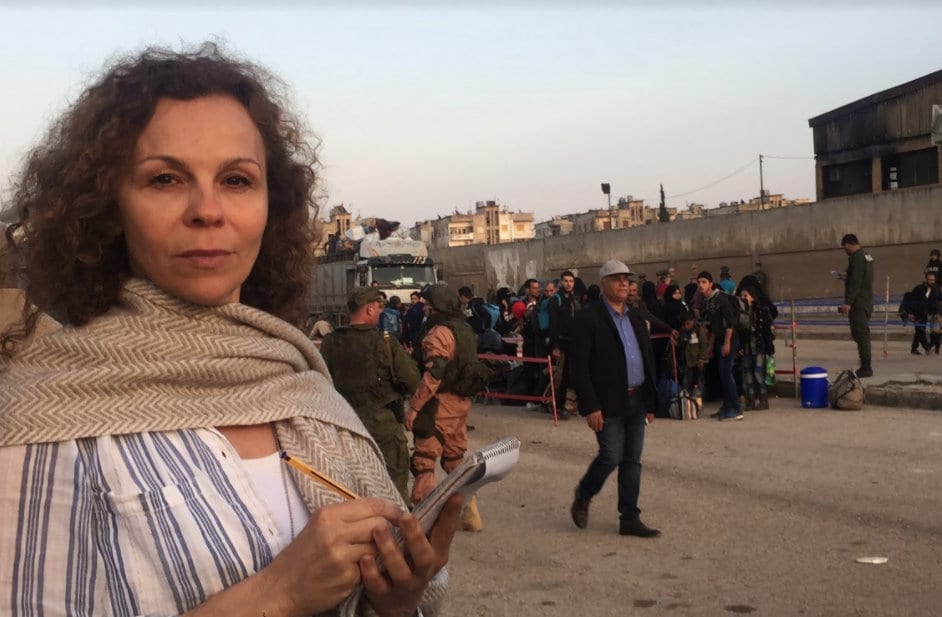
In 2013, it was alleged that the Syrian authorities had used gas against Ghouta and then US President Barack Obama threatened to bomb Syria. “The terrorists in our village celebrated and imagined that they should now rule Syria.”
Later it was revealed that terrorists were behind the gas attack and plans to bomb were called off. Nevertheless, the resentment is strong.
“We as Syrian Christians know that the United States help those who want to eliminate us from Syria. We consider the United States and Obama to be responsible for what has happened to us in Maaloula. ”
On April 20, 2014, the city was declared liberated. 200 soldiers died in combat.
On a small square, next to one of the village’s mosques, is a memorial decorated with crosses dedicated to two of soldiers who sacrificed their life to save Maaloula.
The Syrian army consists of men and women from all religions. Among the so-called rebels there is no religious diversity.
“Everyone in the neighbouring city where I work are Muslims, none of them have any problem with me being a Christian. The inhabitants of Ayn At Tina helped us fight the intruders. We Christians and Muslims live well together, but we cannot live with extremists.
Now the president is the symbol of the unity of Syria. When you support these extremists, you support the elimination of Christians from the Orient, but we refuse to leave Syria, we belong here. ”
Attorney Naji Elian is the town mayor. He insists that I must taste the wine they sell at the church’s souvenir shop and we make a toast for world peace. “We are rebuilding churches with great diligence. In six months, everything will be done. But the homes of those left here are most important, we repaired them first. ” We make a toast for that as well.
The destruction of the little town of Maaloula were enormous, but they could not prepare me for what I would see in the city of Aleppo the following day. I had a total melt down.
Aleppo – Syria’s industrial city
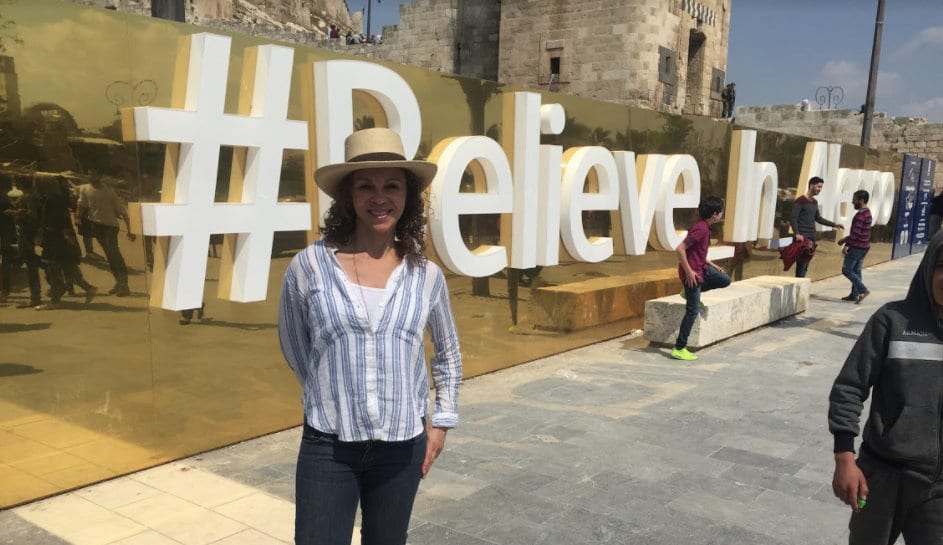
Damascus and Aleppo are 340 kilometres apart, but because many of the roads are surrounded by snipers we had to travel 580 kilometres to reach Aleppo.
We pass at least ten kilometres of oil tankers queuing on the road. The oil refineries were attacked and all but two are destroyed. Therefore, the oil must be shipped for miles to be processed. This has enormous consequences for industry, the economy and the environment.
Such long lines of tankers full of stolen Syrian oil drove across the border to Turkey for months during 2015, but only when Russia engaged in the fighting and put an end to it, this became known in the mainstream media, even though the allegations had circulating for a long time.
I remember that at the time I ironized that American intelligence can take satellite pictures showing the number of peas I would have on my dinner plate, meanwhile claiming they had not discovered these endless rows of trucks.
Now that I witnessed this, it is obvious that they must have known.
We enter the Aleppo region at dusk. It’s like driving through a nightmare. Quarter after quarter of broken buildings on a scale impossible to comprehend. As far as the eye can see everything is dead, desolate, broken.
No scenographer could create such a grotesque ghost town of what once was a busy industrial city where one million people had their job, where 1500 factories and workshops produced everything imaginable.
I was overwhelmed with emotions and could not hold back the sobs and tears.
This was too much. All the horrors I had seen documented on videos had happened right here, to the people living here, just a few months ago.
The various terrorist groups are eager to post videos on the internet, so I knew about the atrocities they had committed in the occupied part of the city. Public whipping, torture, executions and decapitations are duly documented through the terrorists’ own postings, they brag.
The people living here, and in other sieged cities, ordinary people like myself, have lived under the horrors of the terrorists, the fighting between the army and the terrorists, fighting between rivalling terrorist groups, and bombing from the Russian and Syrian air force.
Whichever side they were on, the fear must have been unbearable for the people living here, especially for the children. It’s hard to comprehend how people have managed.
Fares Shehabi’s clear message
“The Western-supported Islamists try to drive Christians out of the Middle East.” I’m sitting across the table with Fares Shehabi at the Al-Khardal restaurant in the Western part of Aleppo.
Shehabi is an independent parliamentarian for Aleppo and knows better than most how the last six years have been here. He is also chairman of the Syrian industrial association and owned three factories before the crisis. Shehabi does not approve of the program offering amnesty to terrorists.
“Terrorists are not completely gone, they surround the city and are still are attacking us all the time.”
People keep coming over to the table to greet him. A group of party-dressed people enter, looking quite festive. They also stop to greet Shehabi before settling at their table. One of the men gets an extra-long hug.
“This is my friend Tony. He lost his child. A ten-year-old boy, we called him Giorgino. He sat at home doing his homework when a rocket attack from the terrorist side of the city hit the house.
Tony’s only son was killed four years ago. The family left Aleppo. They came back right now, today. The terrorists attacked these areas intentionally to drive out Christians and Armenians because they knew they were supporting the government. Now, several families are considering moving back.”
Shehabi tells me that the children’s hospital I visited a couple of days earlier was the headquarters of the Al Nusra front and IS in East Aleppo. IS and Al Nusra had their headquarters on the same floor, right next to each other. He shows me a picture of the letter he received when in 2013 they seized one of his factories. The letter reads “Meet the brothers at the children’s hospital, our headquarters.”
“First, they stole all the equipment and sent it to Turkey. Remember, this was an important hospital with services free of charge, including operations.
How can you destroy a hospital and turn it into a bunker for Al Qaeda? The reason was that these are solid, reinforced buildings that would withstand hard attacks. They turned it into a prison and religious courts and administration. And when we tried to take it back, Western media accused us of bombing hospitals. ”
He also told me about how the Aleppo industrial area was robbed. “During the summer of 2012, absolutely everything was stolen from one thousand factories and sent to Turkey.
They brought huge trailers and took production machines and everything else, even the copper inside the walls. We call Erdogan the thief of Aleppo.
When Shehabi could return to East Aleppo last year, he brought along 200 industrials. All the plants were destroyed. Some of them were transformed into ammunition and rocket productions sites. “Now one factory has become a school for 1600 children.
Like many others I met, Shehabi is making it clear that Turkey’s leader and the organization “Muslim Brotherhood” have been heavily involved in the Syrian crisis ever since 2011.
He said that if the borders to Turkey had been closed the crisis would not have lasted more than a few months.
Fighting for their life, not the president
I told Shehabi that one of the things that made me want travel to Syria was to meet ordinary people. That I wanted to understand more about how they had survived and held their stance through such an aggressive attack for more than six years.
“You think we fight for our president but do not understand anything. I fight for my future, I do not fight for any president, I do not care about any political system. I fight because I do not want to live under Islamists. Do you want to be ruled by Islamists? Look at Idlib.
These groups have been in control there for five years. Show me one village where they have democracy, a functioning civil society or secular administration. You will find none, only al-Qaida system. I do not want such a future. Our president is fighting against this kind of Islamists and we support him in that. ”
There are many Norwegians who have travelled to fight with the terrorists in Syria, and recently Ubaydullah Hussain was sentenced to nine years in prison for recruitment. But in England they cancelled the lawsuit against a returning British citizen. It turned out that Britain financed the terrorist group he had fought for.
Norwegian authorities have deployed soldiers to fight in Syria. Shehabi has not previously heard about 60 Norwegian elite soldiers allegedly training so-called “opposition forces” to fight ISIL.
“Any country that sends armed forces to Syria without our authority’s permission is to be considered taking part in an illegal invasion. We can’t send our troops to Norway without Norway’s permission and say we must do so to fight terrorists in their mosques. And you have many of them now. You have Wahabi mosques there. ”
Terrorists in Europe
Often, we had to take other roads due to the high amount of snipers from terrorist groups. We were initially going to Palmyra, but had to cancel the trip as the road was too dangerous. Photo: Kari Jaquesson.
Shehabi believes that Europe is saturated with terrorists brainwashed by Saudi Arabian Wahhabi ideology and that our authorities must take this matter more seriously.
“You have a big problem in Europe. Third generation home-grown terrorists are being radicalized by imams who were also born in your countries, funded by Saudi Arabian money. You have thousands of them.
Just see what they are doing on social media. If anyone cheers for Al-Nusra and Al-Qaeda on Facebook, don’t you think they will open their home to terrorists?
Of course, they would, at least providing a hiding place for them. There are many terrorists who come to you as refugees. We have six years of intelligence.
We know who has travelled to Germany, Sweden, we know where they have been, who their families are. We know everything about the money channels, and this save lives both here and in your countries. I just can’t understand that your countries want to destroy a secular regime for the sake of a religious one. It is contrary to all common sense. ”
Shehabi told me that when everything started six years ago they were taken by surprise. 70 percent of the city was conquered before the army had been summoned and able to come to their rescue.
“There were demonstrations, but nothing big, maybe 20,000 people participated. That’s not much in a city with three million inhabitants. Most were not even from Aleppo.
We did not realize how the city could be lost in 48 hours, they brought in fighters from Iraq, Afghanistan, al Qaeda, the Muslim brotherhood, people who had been trained and prepared.”
They received weapons from Libya through Turkey. There was still Libyan soil and dirt on them. We don’t have these types of weapons in our arsenal, we have Russian weapons.
This was NATO weapons. There were piles of missiles from Bulgaria. How can Bulgarian weapons come to Aleppo?”
He estimates that 400,000 people have come from tens of different countries via Turkey to fight with terrorist groups for the last six years and that as many as 150,000 may still be in Syria.
“Let’s be very conservative and estimate that 50,000 of them are left here in Syria. 50,000 terrorists. What’s happening in Boston with only two terrorists attacking? Or one man in Paris? Imagine having 50,000 of them!
They loom right outside the city limits. 15,000 civilians have been killed in west Aleppo. How can Western media call these rebel forces? Was Osama Bin Laden a rebel? Every day people were killed here, friends too, and CNN and others describe it as rebel offensive against Assad forces in Aleppo. It’s just not possible to grasp. ”
Shehabi shows pictures of all Qaeda leaders and ends: “Do you think I want these as ministers in my country? Of course, I support Assad, I would have supported Stalin if he were alive.”
So much beauty and hospitality in Syria
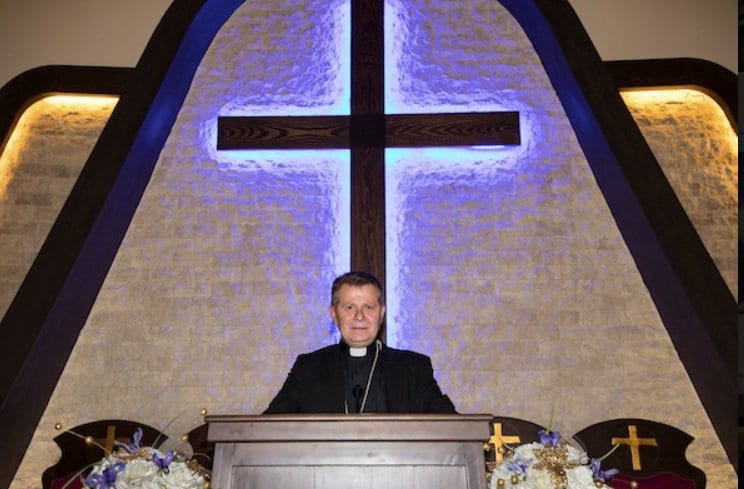
The authorities have already started repairs of damaged monuments. Because the country has such an important historical value, there are many archaeological projects waiting to resume, but also commercial projects that have been put on hold.
The minister of tourism assures me that none of the foreign investors have cancelled their engagements, they are just waiting for peace.
On walks around town, I saw ordinary people repairing, cleaning, planting. Even in some of the heavily damaged buildings in East-Aleppo, new retractable gates were set up to prepare for new businesses.
A roundabout got new curbs, trees and flowers were being planted. Small things, but actions that bear witness of hope for the future.
During the whole crisis, Syria has maintained a wide cultural offer, with theatre, music and sports, these important things that make a society liveable have not been neglected despite the long crisis. In Damascus, I saw the 720-square meter mosaic wall entirely made of recycled material in 2014. It has gained its place in the Guinness Book of Records.
During my last couple of days in Syria, I talked to and interviewed many ordinary people on the street. Everyone expressed the same: “Let us have peace”.
They just want to continue with their lives without having to be afraid of terrorist acts, just like we do. They want to restore their economy. “Before the crisis, a kilo of tomatoes cost 10 cents, now it’s 10 dollars.”
I was invited in for coffee with cardamom at the merchants on the corner and bought corn kernels for popcorn, a popular snack in Syria, they serve this at every bar. with him. Next time we are having a party at home, I am serving Syrian popcorn.
I met people partying at a wedding, families on their way to confirmation in church, taken a few dance steps in a borrowed hat with wedding musicians in traditional costumes, visited several of the amazing historic sites such as the Krak des Chevaliers, the recently reopened citadel of Aleppo which is one of the world’s oldest fortresses.
The great mosque in Damascus, was swarming with school children, Hotel Baron, where Agatha Christie wrote “Murder of the Orient Express” is amazing, The Omajad Mosque in Aleppo, more beautiful than words can express and the souk in Damascus. In the old town, there are plenty of wonderful antique shops.
Had I been able to use my credit card I would have done some serious shopping, but because of the sanctions our credit cards are useless in Syria. This is part of the economic war against Syria.
Syria is a gem of a country, even with huge devastations and constant danger of being attacked and killed by terrorists. I will return. After all, there are still 63 ancient castles to visit.
Hopefully, the towns along the coast that I only know from pictures can soon reopen to accommodate sun and sea bathers. I recall that not so many years ago, Croatia was a cruel war zone. Now it’s one of Europe’s most popular tourist destinations.
The plan was drawn up by the USA in 1986

I also met with Dr Bouthaina Shaaban, who is the media advisor to President al-Assad. She pointed out that the terrorists have deliberately destroyed thousands of years of cultural treasures and economically important projects, that the strategy has been to harm the Syrian civilization itself, wipe out the past, destroy important institutions like the unique seed tank and religious monuments.
Her major concern is the physical and mental health of future generations, particularly of those children still living with parents who are terrorists and are being trained to hate those who are considered infidels.
On the way out of the hour-long meeting, she handed over recently released CIA documents from 1986. These describe exactly how the United States wants to destabilize and divide Syria into three parts.
“So, you see, all these things they accuse us of are just excuses for implementing what they have planned for the last 30 years. That’s not a conspiracy theory, here’s the plan, complete with procedures. ”
Back to Beirut
The second night in Damascus was a bit scary, there was continuous shelling from the terrorists. They are still present on the outskirts around the city. The sound of bombs is a relief in such a context, but not enough to sleep.
The next day I get a taxi to go back to Beirut. The driver is pleased to speak French for the first time in many years. Before, he could practice with all the tourists. Syria grossed 8 billion dollars in tourism in 2010, welcoming 8 million tourists in 2010. The estimates for 2011 were 10 million tourists. Of course, the crisis has been a big setback.
We pass poor looking villages and the driver tells me Palestinian refugees are living there. “We have many from Iraq too, probably one million,” he says. He is right, Syria gave refuge to more than one million Iraqis and half a million Palestinians.
Now the Syrians themselves are displaced in large numbers, both in their own country and abroad. Everyone I’ve met has explained to me how attached Syrians are to their country, to their city. “They’ll be back”, they say.
Steven Sahiounie agrees. He is a Syrian-American, a representative of the Syrian Social Nationalist Party and journalist, published in several news outlets.
“Although it is tragic that so many have fled abroad, it will bring something good. Many will come back with new knowledge. Their children will also have seen other cultures, other ways. When they have seen how the community works in Europe they can bring the best parts back home, and we can get a renewal in the regime in Syria. We need that.”
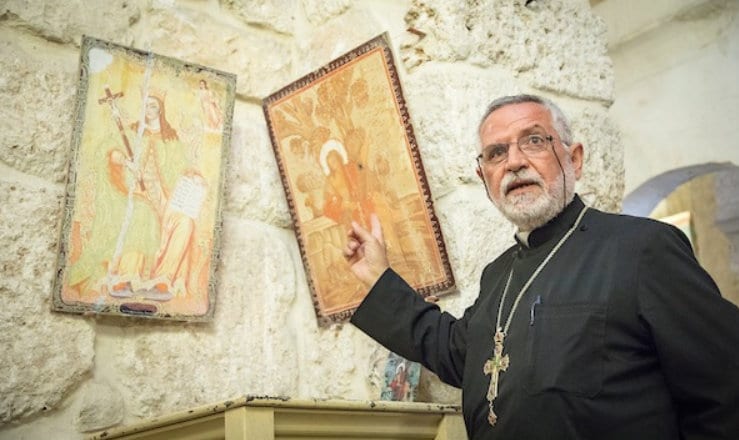
The party’s priority is to fight corruption. “President Assad is a good man. Many have tried to nail him, but you can’t find any spots on that man. He and his wife live a very simple life. I have seen him many times, out and about among people.
Unfortunately, he does not only have good people under him and there is also the issue of corruption. But show me the country that has no corruption.
This is something we Syrians will fix ourselves.” The party also has its own military brigade and fights together the Syrian Arab army against the terrorists trying to destroy the country.
“We used to be an opposition party, now we are concentrating on the same goal as the government, to free our country from foreign fighters, and we will continue the political struggle when the crisis is over.”
Hanne Nabintu Herland: – What Christmas greetings do you have for the Norwegians, what advice can you give us about how we should live for life to matter beyond our own little circle?
Kari Jaquesson: – This is a great honour, thank you very much. Like many in my generation, I went to the Sunday School as a child and my mother gave me children’s books about Jesus with inspirational stories.
Today, my heart belongs to no specific religion, but I am believer, albeit in my own way. To me, love is action, and I try as well as I can to practice this and to always believe in the good in people.
I do not attribute human traits to what I call God like most religions do. Many believe “Allahu akbar” means “God is great,” but it means, “God is greater”. Thus, greater than anything we humans can comprehend. That’s my point of view. I believe that God, or rather divinity, lives in all of us.
Through the choices we make, we can be part of the greater good, but evil forces also live in us, the ego, just caring about oneself, what benefits oneself, without regard to others or the consequences our actions have for others.
For me, God is the collective thinking, that is, thinking of everyone, or at least not just oneself and what benefits oneself.
In Syria, I met many Christians. Surprisingly to many, Jesus is mentioned many more times in the Qur’an than in the Bible, and both Jesus as a prophet and Mary, as his mother are very much revered and respected by Muslims. She is the only woman mentioned by name in the Qur’an.
Today, Jesus would surely have been called a troublemaker and an agitator by the ruling elites just as he was 2,000 years ago. Jesus would most certainly have been part of the anti-war movement and for any Christian it is natural to pursue active resistance to war.
Here we have a long way to go and I would like to see activist churches all over Norway fighting the lethal sanctions and military aggressions being committed in our name.
The level of censorship in social media and search engines is all-time high. Do like thousands of others, subscribe to The Herland Report newsletter here!
Led by Scandinavian bestselling author, Hanne Nabintu Herland, The Herland Report news and opinion website provides independent analysis from leading Western intellectuals and ground breaking YouTube interviews, cutting through the mainstream media rhetoric. It is a great place to watch interviews and read the articles of leading intellectuals, thought leaders, authors and activists from across the political spectrum. The Herland Report believes in freedom of speech and its editorial policy resides above the traditional Left vs Right paradigm which we believe has lost its relevance and ability to describe the current driving forces in Western politics.








